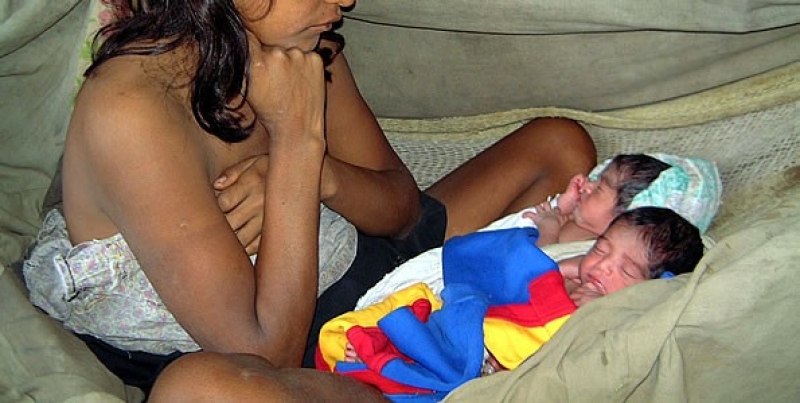Her grandpa was a big man, and strong. He had a sturdy build, like a beer keg with arms and legs. He could walk for hours through the jungle carrying seventy pounds of garden produce, and yet was agile enough to shimmy up tall trees and then slide back down with a stalk of palm fruit in hand.
He was one of the few men in the village who had more than one wife. He tended to live in his own orbit, not fully a part of the village social life, but not completely separate from it either. He always seemed to have a ready smile and polite conversation; a pleasant sort of guy.
That was the grandpa she would have gotten to know if only things had not gone so horribly wrong. As it was, her grandpa was intent on ending her young life. She had been born into this world just a few hours earlier and now plans were being made for her life to be taken from her.
I don’t think her grandpa really wanted to do it, but he had little choice in the matter. Everybody knew that when twins were born, drastic measures had to be taken to protect society. For the good of the community, one, if not both of the newborn twins must die.
The young mother who had just given birth wanted to kill both babies, but grandpa had intervened and said that only one need die. He wasn’t a heartless, sadistic man. That wasn’t it at all. It was just that, with the newborn’s father being away, well, someone had to take charge. Someone had to make the tough decision to do what was best for everybody.
So, this baby girl had to die. Everybody knew that. The afterbirth of his newborn granddaughter had not been cleaned off. She had immediately become an object of fear and revulsion, set aside unattended while the mother concerned herself with her twin sister.
This wasn’t a good situation. Twins were not a good omen. If no one were willing to adopt this unwanted baby and take her far from the village, then grandpa stood ready to do his duty and solve the problem in the same grisly manner that Wilos had been employing for generations past. Strangulation was how these things had been taken care of in the past. His brown eyes searched out a length of vine that would serve the purpose, his expression grim but determined.
The birth of twins is trouble in many tribal cultures; the Wilos were no exception. Now that twin girls had been born, it was unthinkable that the mother would keep both of them. If no one intervened, the unwanted child would be perfunctorily put to death. The clock was ticking; there was little time to waste.
Fear had raised its ugly head. Fear was going to be the death of this innocent baby girl. Several of the Wilos begged us missionaries to take the baby and save her life. They didn’t want the child to die, but the rules of their society were very clear; culturally their hands were tied.
To what extent should we get involved in this? We really didn’t know. We could do what these Wilos were asking and rescue the baby from her imminent death, but doing so might well compromise our future in the village. The Wilos might later insist the child be taken away from the village and raised elsewhere. Or perhaps they would blame the taboo child (and by association us) for any sickness and misfortune that might befall the village in the future. Should we jeopardize our ministry among the Wilos in order to save this baby’s life?
Another option was to tell the Wilos that they shouldn’t kill the baby. Maybe they would listen to us and decide to risk allowing the baby to live among them. But we weren’t there to impose our own moral standards on the tribal people. We were not an authority in their lives to be dictating what they should or shouldn’t do. They had invited us to live in their village, not to tell them how to act, but rather to tell them about God’s Talk.
A third option was to simply not interfere. We could stand back and do nothing while the life of this newborn baby was snuffed out practically right in front of our eyes. But that didn’t seem right, either. We were torn.
Fortunately, before we had to choose any of those options, visitors from a neighboring tribe arrived and agreed to take the baby girl. Her life was spared, and grandpa was relieved to not have to carry through with his grisly duty.
Have you heard of two men named Perez and Zerah? The Bible says that they were twins born to Judah and Tamar. What about Jacob and Esau? They were twins, too, and the Bible has much to say about them.
What would the Wilos think about these twins? Would they assume that because they were twins, they might actually have been evil spirits? Would they think that these twins should have been put to death immediately upon being born? Would they conclude that the conflict between Jacob and Esau was a direct result of one of them being an evil spirit?
It would do a terrible injustice to God’s Word were we to allow this kind of thinking to be applied to it. We needed to make sure we understood how the Wilo people thought about such incidents so that we could know where possible misunderstandings were likely to occur. We needed to be able to not only speak the Wilo language, but to think like a Wilo person in order to communicate God’s Word effectively to them.
If you enjoyed this excerpt, you'll love the book Our Witchdoctors Are Too Weak. Get your copy today.

